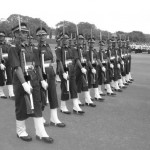When the then Prime Minister told him that she was under great pressure from her cabinet to march the army into East Pakistan, Manikshaw told her that he could resign if that would help her. She had to then orchestrate diplomatic moves to gain international support etc.
There are indeed innumerable instances from history where military commanders were able to carry their point and proved eminently correct. Russian army was required to to defend Moscow against Napoleon’s advance on that city. The Czar and his entourage insisted that the city must be defended. But purely from the strategic military angle Marshal Kutozov thought otherwise. Withstanding enormous pressure from the Czar and others Kutozov did not defend Moscow and in the process saved Russia, its army and eventually brought about complete destruction of Napoleon’s army. During the invasion of Europe in Second World War, (operation Overlord) as a political decision, the governments of United States and Britain decided to keep ‘Strategic Air Command’ outside the command of Eisenhower; the supreme Commander of Operation ‘Overlord.’ Eisenhower told them that, in which case to find some one else to command ‘Overlord.’
As at Kargil, Pakistan had distinct tactical advantage in its offensive at Chamb during 1965. Consequently the Army Chief impressed upon the then PM the imperatives of wresting initiative and opening another front against Pakistan across the International Border and obtained his clearance for the same. Though politically no one wanted a full scale war. This was at a time when Pakistan enjoyed marked superiority in armour (qualitatively and quantitatively) and our edge in infantry and artillery was only marginal. In a span of just two weeks India was able to bring about destruction of Pakistan armour and much else.
In 1971 the political compulsions and the policy demand was to march into East Pakistan in the months of May-June to relieve the unbearable pressure of influx of millions of refugees. The strategic military compulsions were quite different. The army chief had become the subject of malicious whispering campaign. When the then Prime Minister told him that she was under great pressure from her cabinet to march the army into East Pakistan, Manikshaw told her that he could resign if that would help her. She had to then orchestrate diplomatic moves to gain international support etc.
| Editor’s Pick |
Weigh this against the meeting on 18 May 1999, where the service chiefs meekly accepted orders from the PS to the PM (not the PM) without a whimper, detailing the defence forces not to use air power and permitting ‘hot-pursuit’ of the enemy, only in the area of the ingress! Thus driving troops into suicidal frontal attacks up those impossible heights and slopes over a terrain where fire support was so much less effective.
It was left to a Pakistani brigadier to spell out in the Dawn, the course Indian army should have adopted rather than bash its head against the Kargil heights and suffer avoidable heavy casualties thus discrediting generalship. After the slaughter of frontal attacks during the First World War, Liddell Hart in a seminal work called, ‘The Strategy of Indirect Approach‘ spelled out the way to achieve strategic aim, suffering minimum loss of lives and that is what the Pakistani Brigadier alludes to and Alexander followed at Jhelum against Porus. In times of war the top military leader bears enormous responsibility both to the nation and his army. He must fearlessly and forcefully advice the government on strategic military compulsions and where fails to carry his point then he must act according to his own light and conscience.
Had India responded by an appropriate riposte to Pak perfidy at Kargil, in all probability what followed in way of attack on Parliament, other terrorist attacks and the Bombay carnage may not have happened. As the Americans pull out of Afghanistan and the developing situation between the Indus and Hindhukush corridor and J and K point, India may be in for much greater problem.




